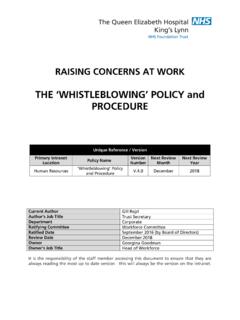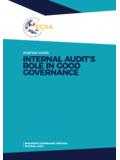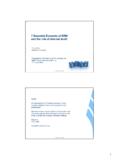Transcription of INFORMATION GOVERNANCE POLICY - qehkl
1 INFORMATION . GOVERNANCE POLICY . Version Next Review Primary Intranet Location Next Review Year Number Month INFORMATION Management &. 2018 January GOVERNANCE Current Author Phil Cottis Author's Job Title INFORMATION GOVERNANCE & RA Manager Department IM&T. Ratifying Committee INFORMATION GOVERNANCE Committee Ratified Date 8th January 2015. Owner Gerry Dryden Owner's Job Title Director of HR. It is the responsibility of the staff member accessing this document to ensure that they are always reading the most up to date version. This will always be the version on the intranet Related Policies Confidentiality Code of Conduct Data Protection POLICY Freedom of INFORMATION POLICY INFORMATION GOVERNANCE Management framework INFORMATION GOVERNANCE Strategy INFORMATION Lifecycle & Records Management POLICY INFORMATION Security POLICY INFORMATION Sharing POLICY Stakeholders INFORMATION GOVERNANCE Committee Version Date Author Author's Job Title Changes V3 December INFORMATION Annual review Nic 2010 GOVERNANCE McCullagh Manager V4 February Phil Cottis INFORMATION Annual review 2012 GOVERNANCE & RA.
2 Manager V5 December Phil Cottis INFORMATION Annual review and format change 2012 GOVERNANCE & RA. Manager V6 November Phil Cottis INFORMATION Annual review 2013 GOVERNANCE & RA. Manager V7 November Phil Cottis INFORMATION Annual review 2014 GOVERNANCE & RA. Manager Summary of the POLICY The purpose of this POLICY is to provide details of the framework for implementation of the INFORMATION GOVERNANCE (IG) strategy to enable the Trust to meet its responsibilities for the management of INFORMATION assets and resources. Key words to assist the search engine Caldicott, Confidentiality, INFORMATION , INFORMATION GOVERNANCE , Security, Sharing.
3 IG POLICY v7 2. CONTENTS. PAGE. 1 INTRODUCTION 4. 2 PURPOSE 4. 3 DEFINITIONS 5. 4 RESPONSIBILITIES 6. 5 INFORMATION GOVERNANCE PRINCIPLES 7. 6 INFORMATION GOVERNANCE MANAGEMENT framework 7. 7 MAIN THEMES 8. 8 ESCALATION 11. 9 TRAINING 11. 10 DISSEMINATION OF DOCUMENT 11. 11 REFERENCES 11. 12 EQUALITY IMPACT STATEMENT 12. 13 MONITORING COMPLIANCE 12. APPENDICIES. 1 EQUALITY IMPACT ASSESSMENT 13. 2 IG COMMITTEE TERMS OF REFERENCE 14. IG POLICY v7 3. INFORMATION GOVERNANCE POLICY . 1 INTRODUCTION. INFORMATION GOVERNANCE is a framework for handling personal INFORMATION in a confidential and secure manner to appropriate ethical and quality standards in a modern health service.
4 It provides a consistent way for employees to deal with the many different INFORMATION handling requirements including: INFORMATION GOVERNANCE Management;. Confidentiality and Data Protection Assurance;. INFORMATION Security Assurance;. Clinical INFORMATION Assurance for Safe Patient Care;. Secondary Use Assurance; and Corporate INFORMATION Assurance. It is of paramount importance to ensure that INFORMATION is effectively and efficiently managed, and that appropriate policies, procedures and management accountability provide a robust GOVERNANCE framework for INFORMATION management. The POLICY is intended to be fully consistent and compatible with the policies and practices throughout the NHS and the Trust strategy for INFORMATION GOVERNANCE and is developed to achieve compliance to the Care Quality Commission Outcomes.
5 2 PURPOSE. The purpose of this POLICY is to provide details of the framework for implementation of the INFORMATION GOVERNANCE (IG) strategy to enable the Trust to meet its responsibilities for the management of INFORMATION assets and resources. The aims of this document are: To maximise the value of organisational assets by ensuring that data is: Held securely and confidentially. Obtained fairly and lawfully. Recorded accurately and reliably. Used effectively and ethically, and Shared and disclosed appropriately and lawfully. To protect the Trust's INFORMATION assets from all threats, whether internal or external, deliberate or accidental.
6 The Trust will ensure that: INFORMATION will be protected against unauthorised access;. Confidentiality of INFORMATION will be assured;. Integrity of INFORMATION will be maintained;. INFORMATION will be supported by the highest quality data. IG POLICY v7 4. Regulatory and legislative requirements will be met. Business continuity plans will be produced, maintained and tested. INFORMATION security training will be available to all staff, and All breaches of INFORMATION security, actual or suspected, will be reported to, and investigated by the INFORMATION GOVERNANCE & RA Manager. This POLICY applies to: All INFORMATION used by the Trust.
7 All INFORMATION systems managed by the Trust;. Any individual using INFORMATION owned' by the Trust; and Any individual requiring access to INFORMATION owned' by the Trust. 3 DEFINITIONS. Breach of Confidentiality A breach of confidentiality is the unauthorized disclosure of personal INFORMATION provided in confidence. Confidential INFORMATION Confidential INFORMATION can be anything that relates to patients, staff or any other INFORMATION (such as contracts, tenders etc) held in any form (such as paper or other forms like electronic, microfilm, audio or video) howsoever stored (such as patient records, paper diaries, computer or on portable devices such as laptops, PDAs, BlackBerrys, mobile telephones and USBs) or even passed by word of mouth.
8 Corporate INFORMATION Corporate INFORMATION refers to INFORMATION generated by the Trust, other than clinical or patient INFORMATION and describes the records generated by an organisation's business activities. Disclosure This is the divulging or provision of access to data. INFORMATION INFORMATION is a corporate asset. Whilst all records are INFORMATION , not all INFORMATION is a record. Personal Confidential Data Personal confidential data is INFORMATION that can be used to uniquely identify, contact, or locate a single person or can be used with other sources to uniquely identify a single individual. Public Interest Exceptional circumstances that justify overruling the right of an individual to confidentiality in order to serve a broader societal interest.
9 Decisions about the public interest are complex and must take account of both the potential harm that disclosure may cause and the interest of society in the continued provision of confidential health services. IG POLICY v7 5. Sensitive Data Data held about an individual which contains both personal and sensitive INFORMATION . There are only seven types of INFORMATION detailed in the Data Protection Act 1998 that are deemed as sensitive: Racial or ethnic origin;. Religious or other beliefs;. Political opinions;. Trade union membership;. Physical or mental health;. Sexual life; and Criminal proceedings or convictions.
10 4 RESPONSIBILITIES. Chief Executive The Chief Executive has overall responsibility the establishment of POLICY governing access to, and the use of personal confidential data and where appropriate, the transfer of that INFORMATION across organisational boundaries. As accounting officer the Chief Executive is responsible for the management of the organisation and for ensuring appropriate mechanisms are in place to support service delivery and continuity. Maintaining confidentiality is pivotal to the Trust being able to supply a first class confidential service that provides the highest quality patient care. The Trust has a particular responsibility for ensuring that it corporately meets its legal responsibilities, and for the adoption of internal and external GOVERNANCE requirements.














